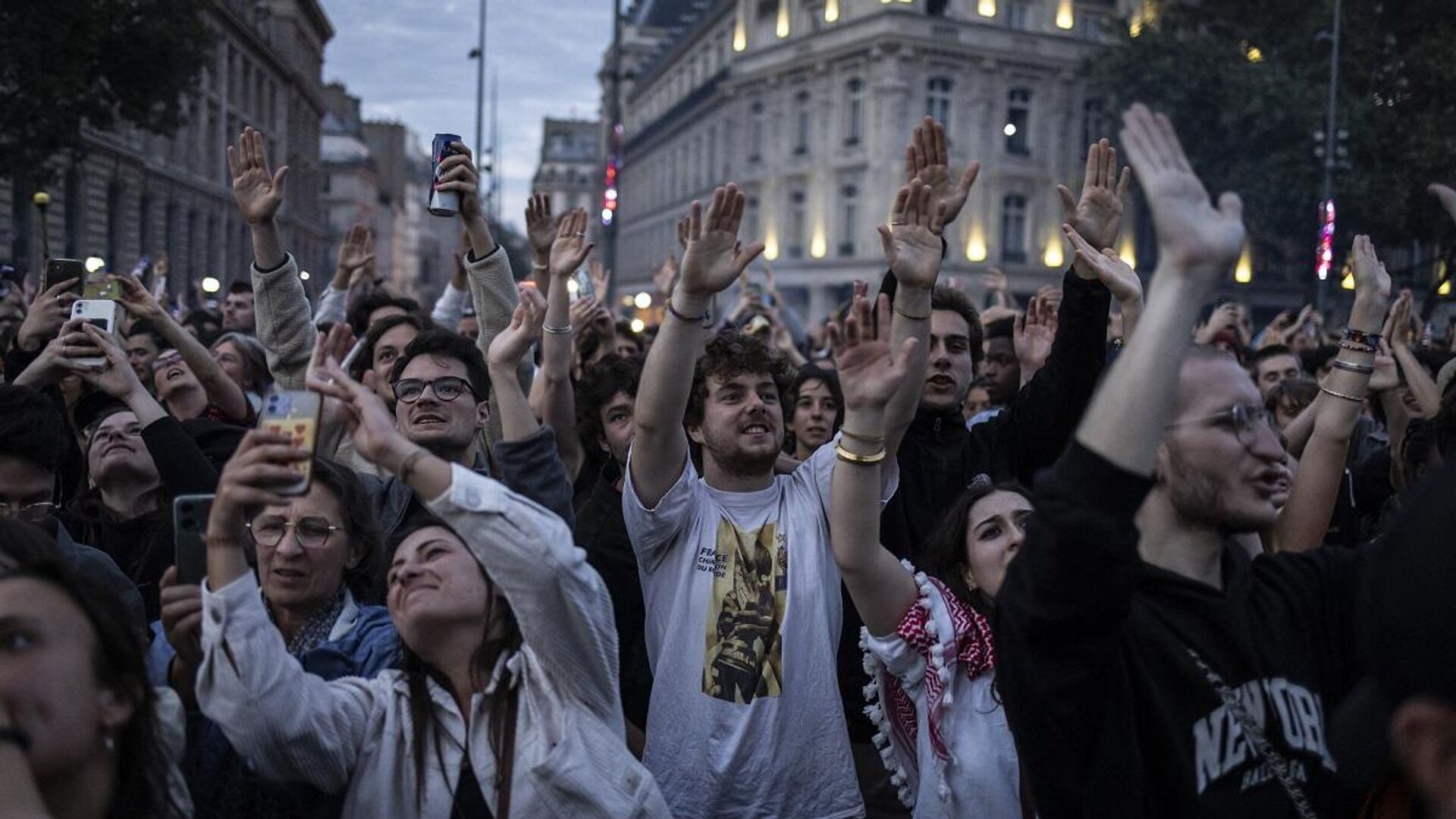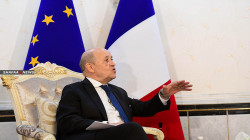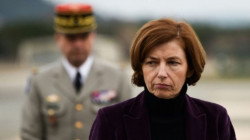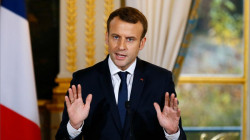France’s leftist New Popular Front wins a shock victory – but now the hard part begins: AFP

Shafaq News/ France's New Popular Front has won the largest number of seats in the final round of snap parliamentary elections, leaving behind the remnants of President Emmanuel Macron’s centrist camp and the far-right National Rally trailing in third place. It’s a staggering result for a closely fought election that has left the country without a clear candidate for prime minister – and the hastily assembled broad leftist coalition without an absolute majority that would allow it to push through its ambitious programme.
The dam has held. After finishing first in the opening round of France’s legislative elections, the far-right National Rally (RN) is trailing third in the final round, estimated by Ipsos Talan to have won between 138 and 145 seats in the National Assembly alongside a splinter group of renegade conservatives from Les Républicains. Marine Le Pen’s party needed 289 seats to win an absolute majority in the 577-seat lower house of parliament. They’ve fallen short – far short.
It’s a shocking result for a party that seemed poised to take power after President Emmanuel Macron stunned the nation – and his own Ensemble coalition – by dissolving the National Assembly last month in the face of a crushing far-right victory over his centrist coalition in the European elections.
In the first round of France's legislative elections, Macron’s camp found itself flattened between a hastily assembled left-wing alliance and a far right flush with victory, receiving less than 21 percent of the vote – far behind the RN, which won almost a third of the votes cast. His ruling coalition also trailed behind the New Popular Front (NFP), a broad alliance of the left-wing France Unbowed, Socialists, Greens and Communists that won 28 percent of the vote.
Part of the National Rally's ultimate defeat can be explained by the endurance of what is known in France as the Front républicain – when voters turn out in force to defeat the far right. Minutes after the first-round results were announced on June 30, France Unbowed founder Jean-Luc Mélenchon announced the NFP had a plan.
This strategy – of building a “front” or "dam" against the far right – was broadly followed by Macron’s camp as well, with both coalitions calling on their voters to cast ballots for better-placed political rivals to keep the RN from power. Between the first and second rounds, more than 200 candidates stood down to stop the far right crossing the threshold to victory.
The night has been a dizzying success for the NFP, who having fallen short of a majority has still won the largest share of seats – between 177 and 192, according to estimates.
By calling a snap election, Macron had likely hoped to catch his fractured and fractious opponents off guard, still bloodied by months of bitter campaigning in the lead-up to the European elections.
And while the far-right Reconquête and centre-right Les Républicains both immediately splintered over whether or not to ally themselves with the rising RN, the forces of the left managed in just a couple of days to unite behind a common political programme that promised a decisive break with years of deeply unpopular Macronist policies.
In place of the president’s pro-business reforms, the new coalition’s programme promised to raise the minimum wage, lower the retirement age and put a price cap on basic goods to fight France’s worsening cost-of-living crisis. This ambitious programme would be financed by sweeping reforms to France’s tax system, including reinstating the wealth tax that Macron had abolished and levying a windfall tax on corporations to pay for an increase in social spending.
Speaking in front of an ecstatic crowd of supporters at Paris’s Stalingrad square, Mélenchon called on Macron to ask the left-wing front to form a government immediately, saying the NFP was “ready to govern”.
"Its constituent parts, the united left, have shown themselves equal to the historic occasion and in their own way have foiled the trap set for the country,” he said. “In its own way, once again, it has saved the Republic."
Once in government, Mélenchon said, the NFP would waste no time in passing its main economic policies by decree, as Macron’s government has done time and time again since losing its own absolute majority in the 2022 parliamentary elections. Others on the left are more circumspect, with the centre-left Raphaël Glucksmann – who performed well on the Socialists’ slate during the EU elections – publicly calling on his allies to act like “grown-ups”.
"We're ahead, but we're in a divided parliament," he said. "We're going to have to talk, to discuss, to engage in dialogue."
For his part, Macron still appears to be mulling his options. According to his aides, the president has said he is “waiting for the National Assembly to organise itself” before he makes any decisions as to who he’ll appoint as prime minister. Current Prime Minister Gabriel Attal said Sunday night that he would be offering Macron his resignation in the morning.
Just who is going to take his place has become the question that will define the weeks to come. The NFP has been steadfast in its refusal to name a candidate throughout the campaign, saying that the final decision will be made by a consensus among the different left-wing forces once their position in the National Assembly becomes clear.
The divisions are stark – Glucksmann, who himself has ruled out running for the post, has publicly said he does not want the divisive Mélenchon in the role. Greens leader Marine Tondelier, herself a strong performer throughout the campaign, has also said Mélenchon, whose fiercely loyal support base is rivalled by legions of detractors put off by his combative debating style and thunderous oratory, will not be in the running.
With no party wielding an absolute majority in parliament and no obvious way forward for the three major political blocs, France is facing the very real prospect of years of political gridlock. And while Macron has vowed not to step down from the presidency until his mandate ends in 2027, years of repeated failure for any of the three movements to pass major – and much-needed – reforms is unlikely to persuade the growing number of RN voters across France that the left or centre are capable of turning the country around.
While the RN is still licking its wounds, tonight’s upset doesn’t change the fact that the far-right party has won the largest number of seats in its history. Already, party president Jordan Bardella has slammed the Republican Front as a “disgraceful alliance” cooked up behind closed doors to keep his party from power – and to prop up a discredited Macronist establishment with left-wing support while leaving no one in a position to run the country.
For Marine Le Pen, who will run again as the RN’s presidential candidate in the 2027 elections, it is a state of affairs that can only benefit a party that is now closer than ever to taking office.
"Our victory has been merely delayed," she said.





